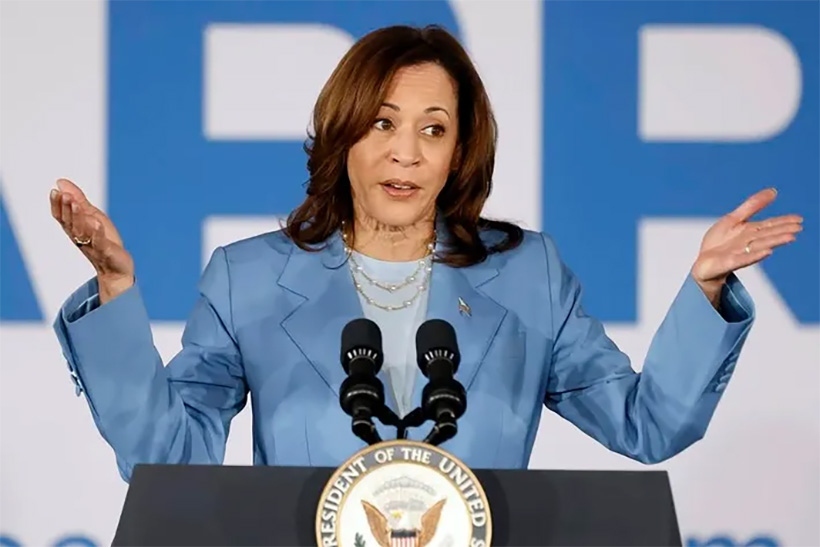SAN FRANCISCO − Venture capitalists pledging support for Kamala Harris’ White House campaign listed priorities in a survey released on Wednesday that include women’s reproductive rights, climate change and a friendlier stance toward startups.

Of about 800 venture capitalists who signed an open letter of support, 225 chose to detail their reasons for endorsing the Democratic candidate and the policies they favor in a survey being reported first by Reuters.
Nearly all of the 225 thought it was a mistake for the Supreme Court to overturn Roe v. Wade, which recognized abortion rights. Some felt this hurt women at work.
“These are not social issues. These are actually business issues,” said Leslie Feinzaig, CEO of Graham & Walker, who started the pledge. The firm invests in women-led companies.
Warm to Harris, pining for Obama
Investors and executives said they viewed Vice President Harris, a Californian with ties to Silicon Valley, as a tech-savvy candidate open to engaging with industry.
They voiced nostalgia for the Obama White House, which a decade ago recruited from and lauded the technology sector. Politicians in Washington have since taken a more critical tone.
The open letter, called “VCs for Kamala” and disclosed in July, includes such venture capitalists as LinkedIn founder Reid Hoffman and Vinod Khosla from Khosla Ventures.
The 225 who filled out the survey did so anonymously. They were 62% men, 66% white, largely aged 35 to 64. Although no one was asked to provide party affiliation, among those who self-disclosed, 70% were Democrats and 30% were Republicans or independents, the poll organizers said.
Some 97% wanted leaders who are “knowledgeable about technologies like AI and crypto to build effective regulations,” and nearly 92% believed the U.S. government needs to hire more technology talent, the survey results showed.
Lagging Europe on AI regulation
Reuters also interviewed entrepreneurs outside the scope of the investor-focused survey to look at what Harris’ Silicon Valley supporters wanted more broadly.
Regarding AI, “We need the smartest people in government who know what to do on the military and civilian side, who know what’s coming,” said Eric Ries, an entrepreneur and author of “The Lean Startup.”
The U.S. has lagged Europe in passing comprehensive AI legislation, though President Joe Biden issued an executive order last year requiring AI developers to report safety tests when there are security or health risks.
Aaron Levie, CEO of cloud-computing company Box BOX.N, said rules for now should focus on applications of technology more than underlying AI models that have yet to mature.
“Regulation is going to set an important trajectory for this industry and our leadership in AI in the long run,” said Levie. He said immigration would, too.
Some 94% of poll respondents said the U.S. needed to make more high-skilled, H-1B visas available, a staple for tech companies that draw talent from abroad. Silicon Valley also wants an easier path for startups to go public or sell to incumbents, the survey results and interviews showed.
Elon Musk and other tech heavies back Donald Trump
Harris is not alone in garnering support from the tech industry.
Former President Donald Trump, Harris’ Republican rival in the Nov. 5 election, won over Tesla CEO Elon Musk and prominent venture capitalists, including Marc Andreessen and Ben Horowitz.
Trump’s running mate, Ohio Sen. J.D. Vance, was a venture capitalist who co-founded a tech donor network aiming to push America to the right, Reuters reported.
Trump has vowed to promote technology rooted in free speech and undo Biden’s AI executive order, which critics including Horowitz say is too prescriptive on technical details.
Democratic backers, meanwhile, have touted Biden’s record and Harris’ work securing voluntary corporate commitments on AI. Neither candidate has detailed AI regulation to pursue if elected.
The Harris and Trump campaigns did not comment for this story.
Silicon Valley had reason to welcome Harris’ speech accepting her party’s nomination last week.
She said as president she would position the U.S. as the world’s AI leader and help founders access capital − rare mentions for a political campaign, said Kieran Snyder, a startup CEO who helped lead the “VCs for Kamala” poll.
A Harris fundraiser in San Francisco this month raised more than $12 million, her campaign said. In July, when Biden was the candidate, she rallied support on a video call that Hoffman urged his peers to attend.
In the survey, 98% of respondents said a few billionaire voices could not accurately reflect their views.
‘Anti-business’
Some Silicon Valley business people still have gripes with Democrats. For one, Biden’s Federal Trade Commission, chaired by Lina Khan, has sued Amazon, Microsoft and others over alleged monopoly power.
Hoffman and media veteran Barry Diller have said they hope Harris will replace Khan, but neither answered requests for comment on their economic priorities for the next administration. An FTC spokesperson, addressing their remarks previously, said Khan has protected consumers and entrepreneurs from corporate abuse.
Chris Larsen, founder of blockchain payments company Ripple Labs, said he wanted Harris to quell what he called the government’s “anti-business stand.” He pointed to officials like Gary Gensler, the Biden-nominated chair of the Securities and Exchange Commission that has sued cryptocurrency companies. The SEC, which under Trump sued Ripple, declined to comment. Of Harris, Larsen said: “Hope is back in season!”





